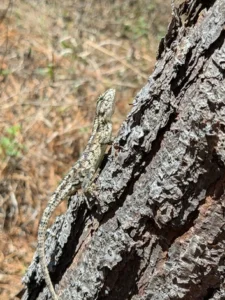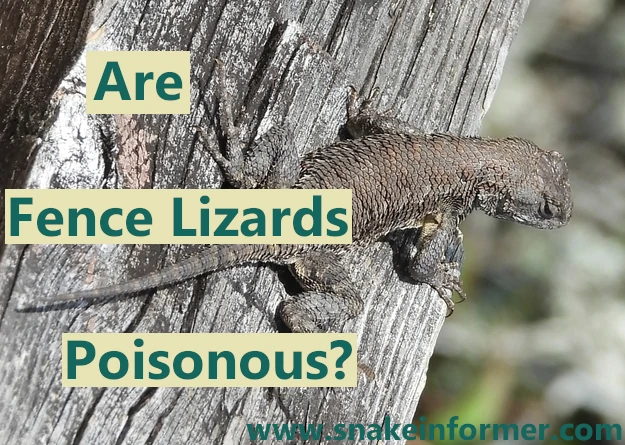Fence lizards are spiny lizards found across much of the United States. These Lizards are commonly seen perched on fences, logs, and other elevated surfaces (hence their name), but are they poisonous?
Fence lizards are neither poisonous nor venomous. They do not produce any toxins and are generally harmless to humans, dogs, cats, or any other pets.
The only real threat they pose is that, like many reptiles, they can be carriers of salmonella bacteria, which can be passed on to humans if sufficient hygiene is not practiced.
To be safe, do not handle fence lizards (or any other reptiles) unless necessary.
When you do handle them, take a few safety precautions, and be sure to wash your hands with antibacterial soap afterward.
Fence Lizards Are Not Poisonous
Fence lizards do not produce toxins that are poisonous or harmful in any way.
For this reason, these lizards are preyed on by many small mammals, a wide variety of birds, and, snakes among other predators.
However, the lack of a toxin does not mean fence lizards are defenseless when it comes to fending off predators. They have other ways to protect themselves.
As the first line of defense, fence lizards have a coloration that helps them camouflage or blend into tree bark, rocks, and dirt in their environments – escaping the notice of predators.

However, sometimes camouflage alone is not enough, so fence lizards also have very quick reflexes.
They are fast runners and excellent climbers, and can quickly dash up trees or under rocks to escape attackers.
When grabbed by a predator, a fence lizard can detach its tail in a process known as autotomy (meaning “self-severing” in Greek).
The detached tail whips around and wiggles on the ground, distracting the predator, while the lizard escapes.
The lost tail grows back over time.
Fence Lizards Are Not Venomous
If you are like most people, you have used the words ‘poisonous’ and ‘venomous’ interchangeably.
However, you should know that there are significant differences between the two terms.
Most poisonous animals are not venomous, and most venomous animals are not poisonous. Confused?
To make things simple:
- If an animal has to bite or sting you to inject its toxins, it is venomous.
- If an animal secretes its toxins outside of its body, and you absorb the toxins when you come in contact with the animal, it is poisonous.
In other words, Venom is actively injected, usually through stings, fangs, or barbs (think copperhead snakes, scorpions).
Poison on the other hand is delivered much more passively and has to be absorbed/ingested into your body.
It can be ingested when it comes into contact with your eyes, lips, the mucus lining of the nose, or open cuts on your skin (think poison dart frogs).
Fence lizards do not secrete toxins on their skin and neither do they have the ability to inject any toxins. For this reason, they are neither venomous nor poisonous.
Are Fence Lizards Dangerous to Humans?
Fence lizards are generally completely harmless to humans.
That being said, it is important to note that all reptiles can carry and shed salmonella bacteria – even if they appear healthy and show no signs of illness.
Fence lizards can carry salmonella bacteria in their digestive tract and excrete it in their waste.

Humans can be exposed to salmonella by direct or indirect contact with a reptile, its waste, or anything the reptiles came in contact with. (For example, you touch a fence lizard or its droppings, then stick your fingers into your mouth without first washing your hands).
Exposure to salmonella can cause an infection called Salmonellosis which is characterized by stomach cramps, diarrhea, fever, nausea, and sometimes vomiting.
Most infections only cause mild illness, but sometimes, the bacteria can spread to the bloodstream leading to serious illness.
Fortunately, merely touching a fence lizard will not cause you to contract salmonella infection. The bacteria can only cause illness when they are ingested.
Therefore, thoroughly washing your hands immediately after touching any reptiles should keep you out of harm’s way.
Are Fence Lizards Dangerous to Dogs or Cats?
Fence lizards are generally harmless to dogs, cats, or any other pets.
However, as mentioned earlier, all reptiles can carry salmonella bacteria so a dog or cat that mouths, bites, or eats a fence lizard may consume the bacteria and develop an infection.
For this reason, it’s a good idea to keep your pets away from any reptiles.
It is extremely rare for healthy dogs or cats to get a salmonella infection. This is because they have very strong stomach acids that kill the bacteria before they can cause any illness. Still, even if the pets don’t show symptoms of salmonellosis, they can shed and spread the bacteria to humans.
Safety Precautions to Take When Handling Reptiles
Generally, lizards and other reptiles do not like being disturbed by humans (or anything bigger than them).
For this reason, it is a good idea to leave fence lizards alone, and only handle them when necessary.
If you ever have to handle a fence lizard, take the following precautions to protect both you and the animal.
Before Handling
- Thoroughly wash your hands under warm water and soap so they are very clean, and rinse them EXTREMELY well.
Even better, you could wear protective gloves, such as powder-free vinyl or latex gloves.
Wearing gloves will protect you from coming in contact with bacteria that may be on the lizard’s skin. It will also protect the lizard from any substances on your hands that may irritate its skin.
Avoid powdered gloves, as they may irritate the lizard’s skin.
When Handling
- Keep the lizard away from your face or mouth.
- As you handle the lizard, do it very gently and with care so you do not injure or stress the animal in any way. Avoid squeezing the lizard too hard, or applying too much pressure on it.
It’s very important never to kiss or snuggle any reptiles, as you could ingest salmonella bacteria that may be in the reptile’s skin.
Reptiles should only be handled for a short time. Handling a fence lizard for too long can cause stress to the animal.
What to Do After Handling:
- Wash your hands with antibacterial soap under running water.
Remember, fence lizards can carry bacteria.
Even if you were wearing gloves, it’s still a good idea to go the extra mile and wash your hands.
Before washing your hands, do not touch anything (you could spread bacteria) – and remember not to rub your eyes, touch your face, or put anything into your mouth.
Frequently Asked Questions:
Do fence lizards bite? Fence lizards can bite but this is very rare.
A fence lizard may bite a human if it is grabbed suddenly, or handled in a way that causes it a lot of stress.
Their bite is nothing to be worried about because their tiny teeth are designed for gripping small prey like insects, rather than biting.
A bite from a fence lizard may cause a light scratch on your skin, but nothing beyond that.
Conclusion
Fence lizards are not poisonous, or dangerous in themselves, but they can carry salmonella.
Practice basic hygiene when interacting with these lizards, and they will be completely harmless.
Hi, my name is Ezra Mushala, i have been interested animals all my life. I am the main author and editor here at snakeinformer.com.

